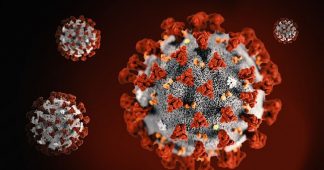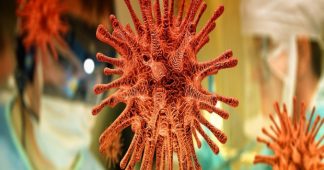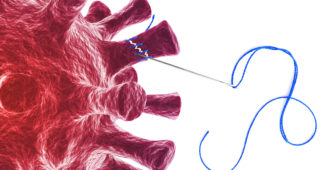Boston University has created a new Covid-19 variant which resulted in an 80% kill rate in mice, according to a new research paper.
Oct.18, 2022
The research hopes to better understand the role played by the virus’ spike protein in terms of how harmful a variant is.
To do this, scientists at Boston University’s biosafety 4 research lab attached the more immune evading Omicron spike protein to the “backbone” of an original Covid virus from the start of the pandemic.
“We generated chimeric recombinant SARS-CoV-2 encoding the S gene of Omicron in the backbone of an ancestral SARS-CoV-2 isolate and compared this virus with the naturally circulating Omicron variant,” the paper published on biorxiv awaiting peer review reads.
“In K18-hACE2 mice, while Omicron causes mild, non-fatal infection, the Omicron S-carrying virus inflicts severe disease with a mortality rate of 80%.
“This indicates that while the vaccine escape of Omicron is defined by mutations in S, major determinants of viral pathogenicity reside outside of S.”
When infected with just the original strain of Covid-19 100% of the mice died, while none of the mice infected with the Omicron variant died.
American molecular biologist Richard H. Ebright has slammed the paper.
“The research is a clear example of gain of function research,” he told Daily Mail UK.
“It is especially concerning that this new US-government ePPP research – like the previous US-government ePPP research on chimeric SARS-related coronaviruses at Wuhan Institute of Virology that may have caused the pandemic – appears not to have undergone the prior risk-benefit review mandated under US-government policies.”
However, Boston University contest the research doesn’t constitute gain of function research as it didn’t make the original Covid-19 strain more virulent.
“First, this research is not gain-of-function research, meaning it did not amplify the Washington state SARS-COV-2 virus strain (original virus from 2020) or make it more dangerous,” BU said in a statement following online reports that the university called “false and inaccurate.”
“In fact, this research made the virus replicate less dangerous,” the university added.
The study’s lead author says the research will help better understand the Omicron variant and come up with new treatments.
“Consistent with studies published by others, this work shows that it is not the spike protein that drives Omicron pathogenicity, but instead other viral proteins,” said lead study author Mohsan Saeed.
“Determination of those proteins will lead to better diagnostics and disease management strategies,” Saeed said.
While Boston University refutes their research is using gain of function.Some experts have argued gain of function research is necessary in the fight against future pandemics.
“Gain-of-function experiments may help researchers test scientific theories, develop new technologies and find treatments for infectious diseases,” a panel of experts concluded in a Conversation article.
“For example, in 2003, when the original SARS-CoV outbreak occurred, researchers developed a method to study the virus in the laboratory. One of the experiments was to grow the virus in mice so they could study it. This work led to a model for researching the virus and testing potential vaccines and treatments.”
The article also states there is no such thing as zero risk when conducting experiments with contagious viruses.
The Boston University research paper noted one limitation to the study was the breed of mice used, as other types are more similar to humans.
This means it’s harder to tell what the mortality rate of the variant would be in humans.
We remind our readers that publication of articles on our site does not mean that we agree with what is written. Our policy is to publish anything which we consider of interest, so as to assist our readers in forming their opinions. Sometimes we even publish articles with which we totally disagree, since we believe it is important for our readers to be informed on as wide a spectrum of views as possible.











